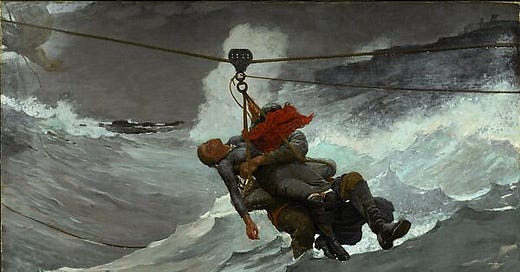Wendell Berry wrote that if a soul were to honestly cry out to God before others, “it would be as though / at a sedate party / a man suddenly / removed his clothes / and took his wife / passionately into his arms.”1 True prayer— the naked candor of communion with God— is shocking. At least it can be shocking, both to experience and to witness. Many of us in western Christianity are not comfortable with that level of vulnerability. It scares us. We like the neatly packaged prayers, the nice words and phrases that satisfy both our religiosity and rationality, that remind us (and God!) that we have not lost our sense of decorum. Better to keep the lid on the unfiltered questions and emotions, though of course they may slip out in desperate times. How foolish we are to minimize our desperate need of him, to convince ourselves that Christ is disinterested in our reality.
I once was told that Eugene Peterson summarized his role as a pastor with two aims: teach people to pray and prepare them to die. I think my nephew Josiah learned both in the six short days that were given to him. His was a whole life, embodying the wisdom of dependence in light of eternity. For him, to pray and to prepare was as simple as breathing. In that mysterious tension of gravity and grace he lived honestly, humbly, wholly.
In contrast, I grasp at a semblance of wholeness wrangled under my own façade of control. My anxious heart is constantly aware that even breathing feels complicated. The tight lid on my emotions inhibits an admission of need before God, even though I know that admission is essential. To hear the voice of God I must get off my high horse, stoop down, and ask for help. Still I find myself falling into old habits, assuming that God expects me to keep it together, complicating dependence with performance. But like Wendell Berry implied, prayer means getting spiritually naked, letting go of the illusion of control, putting the glittering image down.
When I first entered an Anglican church, I was surprised when the priest looked me in the eyes as he gave me the eucharist: “Becca, this is the body of Christ given for you.” The words shocked me, though I’d taken communion in a variety of denominations for decades. Suddenly, it was personal. This was communion. Like Mary Magdalene hearing the resurrected Christ reveal himself by simply saying her name2, I too found myself shocked, amazed, and desperate to touch him. I wept, realizing I was seen— fully— and the invitation to take and to eat was still for me. Each week I crave this sacrament that is truly real: to remember and be re-membered, to know I am welcomed, seen, that Christ himself is praying for me.
I continue to be surprised that the longings, wounds, and hurts are the places he most wants to be invited. Unnerving as it is, his gaze holds healing. Uncomfortable as it is, I am learning to participate: to speak (or scream) the fears and doubts out, to let the illusions go. Coming raw and vulnerable before the Father takes the courage to collapse, but I’m learning to let the pressure out of my chest, to find relief in such honesty, to go headlong. It still scares the hell out of me, but I keep finding myself invited in, repeatedly and gently reminded that communion is for me, that I am beloved.
I sometimes wonder how the disciples responded when Jesus taught them to pray. Did it seem basic and boring, or was it foreign and surprising? I wonder, too, if our modern familiarity with the Lord’s prayer has polished off the grit and power. Maybe it seems benign enough to fit into the neat packaging we are most comfortable with, something sensible and succinct. In reality, it is not a beginner’s prayer that we graduate from: it may be the most naked and wise prayer we can pray. Better to admit our absence of control and live in breath-by-breath dependence on the Father. Better to beat our chests and cry out for mercy, for strength to do the impossible: forgive. Better to scream out for deliverance from evil than to pretend it isn’t there. Better to admit our tendency to despair, while clinging raggedly to the hope that the One who holds the power will not abandon his children. Better to go headlong.
“Your heart is beating, isn’t it?
You're not in chains, are you?
There is nothing more pathetic than caution
when headlong might save a life,
even, possibly, your own."
From "Moments," by Mary OliverFrom “An Embarrassment,” by Wendell Berry
John 20:16





Thank you for this Becca
This is up there with the "What kind of sheep am I today?" essay as most memorable. Thank you. (Gonna read it twice.)